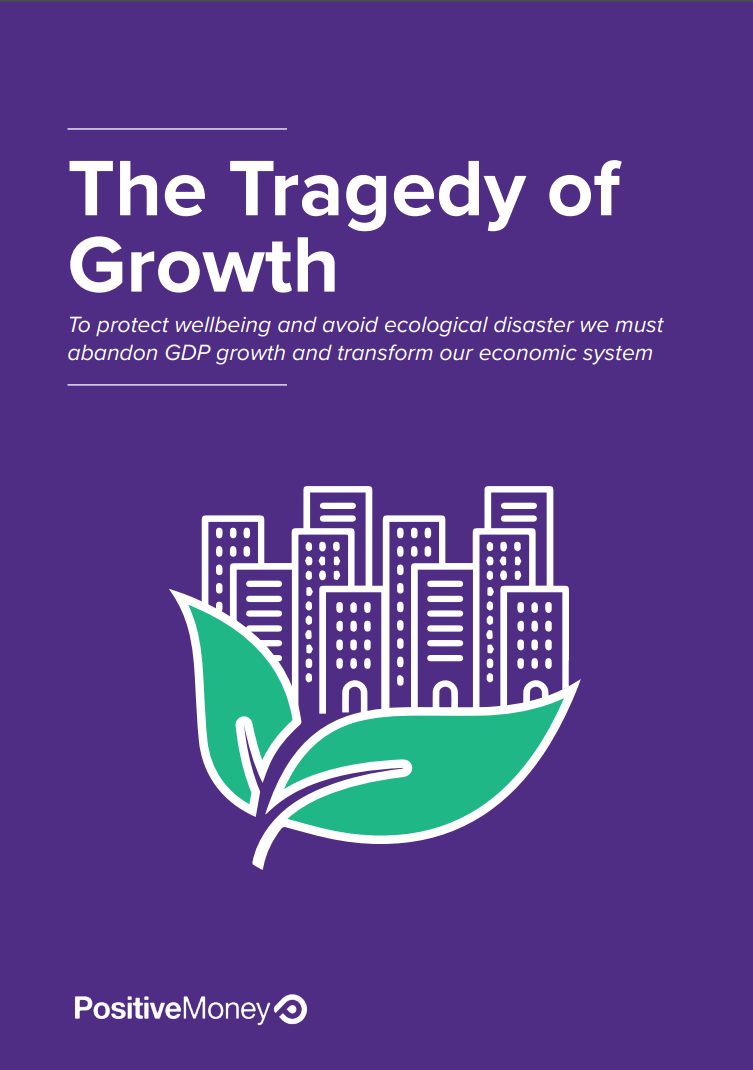The Tragedy of Growth
Published May 2020
To protect wellbeing and avoid ecological disaster, we must abandon GDP growth and transform our economic system.
Published May 2020
To protect wellbeing and avoid ecological disaster, we must abandon GDP growth and transform our economic system.
Critiques of Gross Domestic Product (GDP) as a measure of economic progress are widespread. However ‘beyond GDP’ narratives often seek to complement the dominant indicator with other measures of progress, aiming for ‘inclusive’ or ‘green’ growth, instead of truly moving ‘beyond GDP’.
PDF Download:
Download full report here (Free, PDF, 38 pages)
Contrary to the mainstream narrative, we show that GDP growth, regardless of the form it appears to take, does not enhance life satisfaction, alleviate poverty, or protect the environment. Calls for better kinds of growth do not fully recognise the failures of economic growth, and therefore provide no viable vision for the future.
However, absence of growth in capitalist economies generates strong tendencies toward unemployment and deepening inequality. These structures – referred to as ‘growth imperatives’ – currently present a barrier to reaching a society that prioritises human well-being and environmental sustainability. Focusing on the monetary and financial system, we show a tension between financialisation and growth in high-income countries that prevents an easy shift to a financially stable non-growing economy. We highlight interest-bearing debt as a growth imperative, and put forward transformative monetary policies as a necessary contributor to escaping the growth paradigm.
A universal basic income issued via central bank digital currency, a direct clearing facility, public banks and modern debt jubilees all feature on this agenda for a post-growth money and finance system.
To protect human wellbeing and avoid environmental disaster, we must escape the growth paradigm once and for all. This requires stopping the publication of GDP figures and focusing instead on dashboards of alternative indicators, such as life expectancy, carbon emissions, and education. To support this reorientation of policy goals, decision-making guidance must be made fit for high uncertainty in a crisis-prone world.
This report makes several key recommendations for the Treasury, the Bank of England, and the Office for National Statistics (ONS).
PDF Download:
Download full report here (Free, PDF, 38 pages)
The report is structured as follows:
Chapter 1 shows that the focus on growth in policy, academia, and the media is excessive and misplaced, as growth consistently fails to enhance life satisfaction, alleviate poverty, or protect the environment.
Chapter 2, outlines how, despite growth’s shortcomings, ‘growth imperatives’ in the economic system mean that low or negative growth generates tendencies toward multiple crises.
Chapter 3 charts a path to the elimination of these growth imperatives via a transformation of our monetary and financial systems.
Finally, Chapter 4 explores new measurements, wellbeing frameworks, and decision-making processes that could guide a new policymaking paradigm for a post-growth economy.
